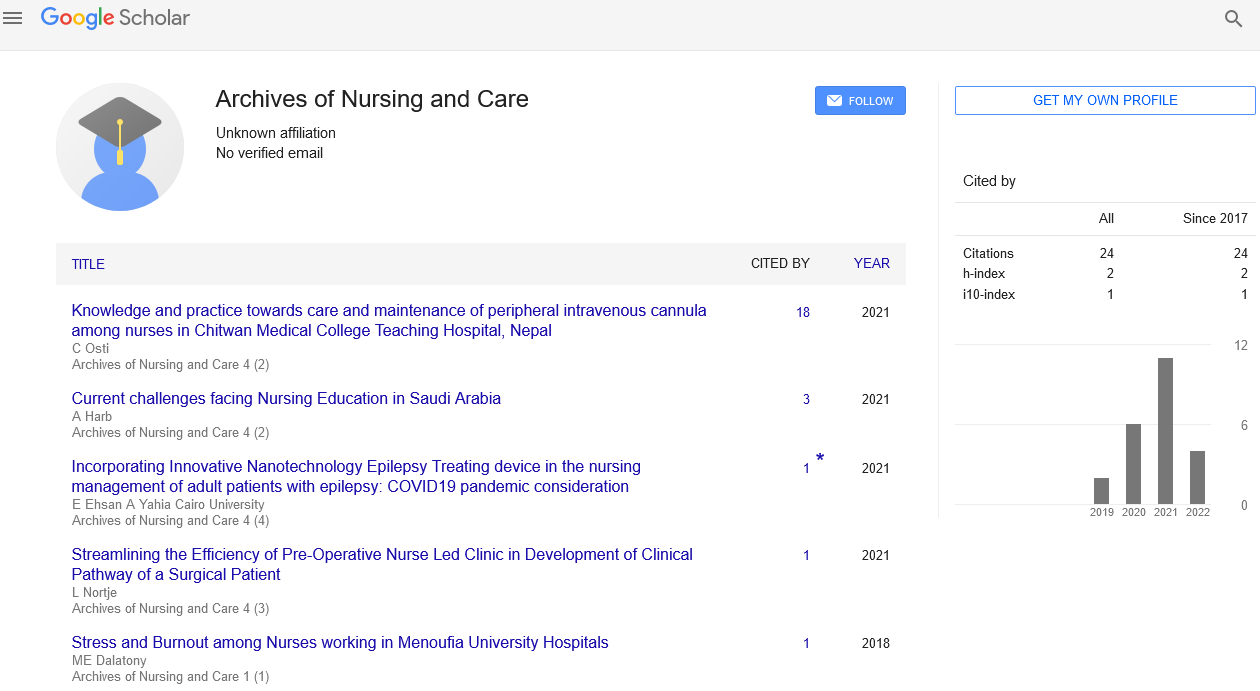Research Article - Archives of Nursing and Care (2023) Volume 6, Issue 2
Barriers of Implementing of Self-Management in COPD Patients at Community Healthcare Centers Evidence-Based Practice in Nursing Profession: A Literature Review
Sato Yusuke*
Division of Pediatric Nursing, Department of Specialized Nursing, Oita University of Nursing and Health Sciences, Oita Prefecture, Japan
Division of Pediatric Nursing, Department of Specialized Nursing, Oita University of Nursing and Health Sciences, Oita Prefecture, Japan
E-mail: Yusukesato@edu.jp
Received: 03-Apr-2023, Manuscript No. OANC-23-92211; Editor assigned: 05-Apr-2023, PreQC No. OANC-23- 92211 (PQ); Reviewed: 19-Apr-2023, QC No. OANC-23- 92211; Revised: 24- Apr-2023, Manuscript No. OANC-23- 92211 (R); Published: 28-Apr-2023, DOI: 10.37532/oanc.2023.6(2). 32-34
Abstract
Evidence-based practice is important in improving the overall quality of patient care, enhance nursing practice and increase the confidence in decision-making. Evidence-based practice is a technique used in solving clinical issues regarding patient care by integrating well-designed evidence with patient preferences, patient assessments and health professionals. The aim of this review is to explore barriers that confront nursing in the implementation of Evidence-based practice. Consequently, by determining some of the barriers to the implementation of EBP among nurses, health care systems can form solutions that allow the health centers to avoid such issues and execute the approach among health care providers.
Nursing administrators and educators have the main role to facilitate evidence-based practice implementation among nurses, therefore; the findings of this review can help to overcome the identified barriers. Training and education are important to enhance knowledge and skills of nurses to use evidence based in practice. Time management, providing the required resources and adequate supervision can facilitate the implementation of evidence-based practice which positively influences the quality of care.
Keywords
Chronic Obstructive Pulmonary Disease (COPD) • Exercise capacity •Quality of life •Self-efficacy •Self-management • risk management
Introduction
Chronic diseases, such as chronic obstructive pulmonary disease (COPD), are a major cause of death and disability in high income countries and of rising importance in low and middle income countries. Owing to their high prevalence and chronicity, current international policy focuses on the need to support patients to self-manage their conditions. Most interventions designed to support self-management have been targeted at people with more severe disease who are likely to be motivated to change behaviour, and where there is the most opportunity for symptomatic improvement [1]. However, more recent efforts have aimed to prevent onset or slow progression early in the disease course to reduce the burden and costs of treating more advanced disease later. This prevention model has only recently been adopted in COPD, with calls for interventions to reduce risk in people with early disease. The growing number of people at risk of developing long term conditions and the prevalence of early disease, means an accessible and low resource approach needs to be taken to support self-management. One such approach is to use interactive telephone health coaching, with the coach and patient working together to identify barriers to behaviour change and finding ways to overcome them. Key techniques include modelling behaviour, goal setting, and empowering the patient to improve their health status. Telephone health coaching has shown potential benefits on self-efficacy, health behaviour, and health status in a rapid review of trials in long term conditions [2].
Many components of self-management interventions could promote better health and prevent disease progression in the early stages of COPD. Smoking is a major cause of COPD, and smoking cessation has been shown to be beneficial in maintaining better lung function and in slowing disease progression across all severity levels. Reduced physical activity level is an independent risk factor for exacerbations, hospital stays, and mortality among those with COPD and occurs even in the early stages of disease. Inhaler treatments have well established efficacy in reducing exacerbations and admissions among patients with moderate and severe COPD, and growing evidence of efficacy in improving clinical outcomes and reducing decline in lung function among patients with more mild impairment. Any intervention that improves medication adherence and inhaler use technique, which is frequently poor, is thus likely to improve outcomes for patients. Sixty per cent of primary care patients with COPD report exacerbations of their disease, which are associated with more rapid decline in lung function [3]. Interventions that aim to reduce the severity of exacerbations include prompting early recognition of symptoms and rapid use of antibiotics or corticosteroids, or both, either through seeking a primary care appointment or use of a self-treatment rescue drug pack.
We evaluated telephone health coaching in patients with mildly symptomatic COPD to explore the effectiveness of supporting self-management activities in this group of patients. We hypothesised that a telephone health coaching intervention delivered by a nurse to support self-management, compared with usual primary care, would lead to improved COPD health related quality of life at 12 months follow-up and would improve physical activity, smoking cessation, self-management behaviours, psychological health, and self-efficacy [4].
Intervention and usual care
This was a pragmatic trial with no constraints on doctors’ management of the participants in either group.
The usual care group received a standard information leaflet about self-management of COPD. The 13 page leaflet gave a definition of COPD, a detailed description of associated symptoms, how the illness can be managed with the use of inhalers, how to treat exacerbations, and details of other resources [5]. The intervention consisted of telephone health coaching delivered by a nurse with supporting written documents, a pedometer, and a selfmonitoring diary. This aimed to support selfmanagement in relation to smoking cessation, physical activity increases, correct inhaler use technique, and medication adherence. For those with recurrent exacerbations, it also aimed to improve patient confidence in identifying an exacerbation early in order to start rescue drugs [6].
Randomization and masking
Patients who had given informed consent and completed all the baseline measures were individually randomized in a 1:1 ratio to the telephone health coaching or usual care group stratified by centre. The allocation was made using a web-based programme hosted by the Primary Care Clinical Research and Trials Unit, University of Birmingham. Centre specific randomization lists were produced by a statistician at the trials unit. The four recruitment centres were Birmingham and West Midlands South, Greater Manchester, West Midlands North, and Oxfordshire or Gloucestershire. Only the Primary Care Clinical Research and Trials Unit had access to the allocation sequence. Patients were informed of their allocation at the end of the recruitment appointment; they were not masked to treatment allocation. Data were entered into the study database by researchers at the University of Birmingham who were masked to the treatment allocation [7].
Discussion
A number of studies showed the benefits of patients self-management on physiologic and psychological health for patients with COPD. Therefore, the self-management program was conducted to improve health outcomes for COPD patients at three community healthcare centers in China, which further confirmed the effects of self-management in COPD patients. The more favorable improvements in exercise capacity and HRQoL in SM group were observed compared to UC group over 6-month intervention. The HRQoL of patients in SM group demonstrated a great improvement in comparison with peers in UC group. The similar results were also reported from previous studies [8]. Bosma et al. reported positive effects on HRQoL for COPD patients in intervention group. A recent review showed the comparison results of 16 studies in the effects of self-management on HRQoL for COPD patients, five studies reported statistically significant and clinically relevant improvements in HRQoL in intervention group compared to ones in control group, while nine studies reported no effects. The different measurements are utilized to evaluate the effect of self-management on HRQoL may result in diverse results. The effectiveness of self-management on HRQoL for the population needs to be further confirmed in next study. The scores of CSES in COPD patients from baseline to the sixth month demonstrated improvement in SM group; there was marginal statistically significant difference. However, there was also no sustained effect of selfmanagement on self-efficacy during 6-month intervention. Regarding the efficacy of selfmanagement on self-efficacy, a number of studies demonstrated different results [9]. For instance, the results from a meta-synthesis study revealed that there were six studies reported the significant improvements of self-efficacy for COPD patients in SM group in comparison with peers in control group, three studies showed no obvious effects on self-efficacy by SM intervention. The shortterm SM and limited intervention dose may be the potential reason for minute effect of self-management on self-efficacy in the study. The following limitations of the study should be considered. Firstly, the study is merely administered at three community healthcare centers in two districts and thus the results may not be generalized to other clinical settings. Secondly, all participants are in stable phase and have mild or moderate COPD, those in acute phase and the severe patients are excluded. Therefore, the results cannot be extrapolated to this population. Thirdly, some minor statistical differences are likely not to be detected because of small sample size and short-term intervention. Lastly, the self-report diaries and scales are used to evaluate their self-practice, which might reduce the validity of the outcome measurements [10].
Conclusion
The study showed that the nurse-led selfmanagement program is effective for COPD patients at community healthcare center in China. It provides clinically significant improvements in patients’ exercise capacity and HRQoL for COPD patients in SM group compared to those in UC group. It also presents evidence to support the feasibility of learning and practicing self-management for COPD patients at community and home. The sustaining effects of self-management among Chinese COPD patients need to be confirmed using follow-up design in future study.
References
- Chang RL, Deen WM, Robertson CRet al.Permselectivity of the glomerular capillary wall: III. Restricted transport of polyanions.Kidney Int.8, 212-218 (1975).
- Takakura Y, Fujita T, Hashida Met al.Disposition characteristics ofmacromoleculesin tumor-bearing mice.Pharm Res.7, 339-346(1990).
- Yamamoto Y, Tsutsumi Y, Yoshioka Yet al.Site-specific PEGylation of a lysine-deficient TNF-alpha with full bioactivity.Nat Biotechnol.21, 546-552(2003).
- Kaneda Y, Kamada H, Yamamoto Yet al.The use of PVP as a polymeric carrier to improve the plasma half-life of drugs.Biomaterials.25, 3259-3266(2004).
- Tsunoda S, Kamada H, Yamamoto Yet al.Molecular design of polyvinylpyrrolidone-conjugated interleukin-6 for enhancement of in vivo thrombopoietic activity in mice.J Control Release68, 335-341(2000).
- Norouzinia R, Aghabarari M, Kohan Met al.Health promotion behaviors and its correlation withanxietyand some students’demographic factors of Alborz University of Medical Sciences.Journal ofHealthPromotion Management. 2(4), 39- 49(2013).
- Pierce C.Health promoting behaviors of rural women with heart failure.Online Journal of RuralNursingandHealthCare. 5(2), 28-37(2005).
- Fayazbakhsh A, Khajeh KR, Soleymani NMet al.The Internet Using and Health: Students’knowledge, Attitude and Lifestyle Related to the Internet.Hakim Research Journal. 14(2), 96-105(2011).
- Chiou ST, Chiang JH, Huang Net al.Health behaviors and participation inhealthpromotion activities among hospital staff: which occupational group performs better?BMCHealthServ Res. 14(1), 474 (2014).
- Evangelista LS, Shinnick MA.What do we know about adherence and self-care?J Cardiovasc Nurs. 23, 250-257(2008).
Indexed at,Google Scholar ,Crossref
Indexed at,Google Scholar ,Crossref
Indexed at,Google Scholar ,Crossref
Indexed at,Google Scholar ,Crossref
Indexed at,Google Scholar ,Crossref
Indexed at,Google Scholar ,Crossref
Indexed at,Google Scholar ,Crossref

